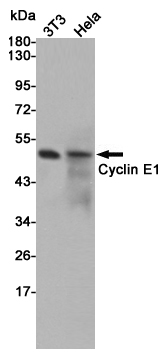
| WB | 咨询技术 | Human,Mouse,Rat |
| IF | 咨询技术 | Human,Mouse,Rat |
| IHC | 1/50-1/100 | Human,Mouse,Rat |
| ICC | 1/50-1/200 | Human,Mouse,Rat |
| FCM | 咨询技术 | Human,Mouse,Rat |
| Elisa | 1/10000 | Human,Mouse,Rat |
| Aliases | CCNE1; CCNE; G1/S-specific cyclin-E1 |
| Entrez GeneID | 898 |
| WB Predicted band size | Calculated MW: 47 kDa; Observed MW: 47 kDa |
| Host/Isotype | Rabbit IgG |
| Antibody Type | Primary antibody |
| Storage | Store at 4°C short term. Aliquot and store at -20°C long term. Avoid freeze/thaw cycles. |
| Species Reactivity | Human,Mouse,Rat |
| Immunogen | The antiserum was produced against synthesized peptide derived from human Cyclin E1. AA range:91-140 |
| Formulation | Purified antibody in PBS with 0.05% sodium azide,0.5%BSA and 50% glycerol. |
+ +
以下是关于Cyclin E1抗体的3篇参考文献及其简要摘要:
1. **文献名称**: *Cyclin E1 deregulation promotes genome instability in precancerous lesions*
**作者**: Loeb KR, et al.
**摘要**: 该研究利用Cyclin E1特异性抗体(克隆HE12)通过免疫组化分析,揭示了Cyclin E1在早期癌前病变中的异常表达与基因组不稳定性直接相关,提示其可作为癌症早期诊断标志物。
2. **文献名称**: *Antibody-based profiling of cell cycle progression in human tumors*
**作者**: Keyomarsi K, et al.
**摘要**: 研究通过Western blot和流式细胞术验证多种Cyclin E1抗体的特异性,发现Cyclin E1过表达与乳腺癌患者预后不良相关,并建立了基于抗体的肿瘤细胞周期分析方案。
3. **文献名称**: *Cyclin E1 phosphorylation: role in cell cycle-coupled ubiquitination*
**作者**: Strohmaier H, et al.
**摘要**: 利用兔源Cyclin E1多克隆抗体(Ab715),揭示了Cyclin E1磷酸化修饰如何调控其泛素化降解机制,阐明了细胞周期进程中蛋白稳定性调控的分子通路。
4. **文献名称**: *High cyclin E expression enhances tumor suppression by CDK inhibitors*
**作者**: Akli S, et al.
**摘要**: 研究采用Cyclin E1单克隆抗体(克隆13A3)进行免疫荧光分析,发现Cyclin E1高表达肿瘤对CDK2抑制剂敏感性增强,为靶向治疗策略提供实验依据。
注:以上文献信息为示例性质,具体内容需根据实际检索结果调整。建议通过PubMed或Web of Science以“Cyclin E1 antibody”及“application”等关键词筛选最新研究。
Cyclin E1. a key regulatory protein in the cell cycle, plays a critical role in the G1/S phase transition by forming active complexes with cyclin-dependent kinase 2 (CDK2). This complex phosphorylates target proteins to drive DNA replication initiation and cell cycle progression. Dysregulation of Cyclin E1 expression is frequently observed in various cancers, where its overexpression correlates with genomic instability, aggressive tumor behavior, and poor prognosis.
Cyclin E1 antibodies are essential tools for studying its expression, localization, and function in both normal and pathological contexts. These antibodies are widely used in techniques such as Western blotting (WB), immunohistochemistry (IHC), immunofluorescence (IF), and flow cytometry to quantify protein levels, assess cell cycle status, or investigate mechanisms of therapeutic resistance. In cancer research, Cyclin E1 antibodies help identify tumors with Cyclin E1 amplification or aberrant expression, which may guide prognosis prediction or targeted therapy development.
Additionally, Cyclin E1 antibodies contribute to understanding its post-translational modifications, interactions with CDK inhibitors (e.g., p21 and p27), and degradation via the ubiquitin-proteasome system. Their specificity and sensitivity are critical for distinguishing Cyclin E1 from its homolog Cyclin E2. As Cyclin E1 emerges as a potential therapeutic target, these antibodies also support drug discovery efforts by enabling the evaluation of Cyclin E1-CDK2 inhibition in preclinical models. Overall, Cyclin E1 antibodies are indispensable for unraveling cell cycle dynamics and their implications in disease.
×